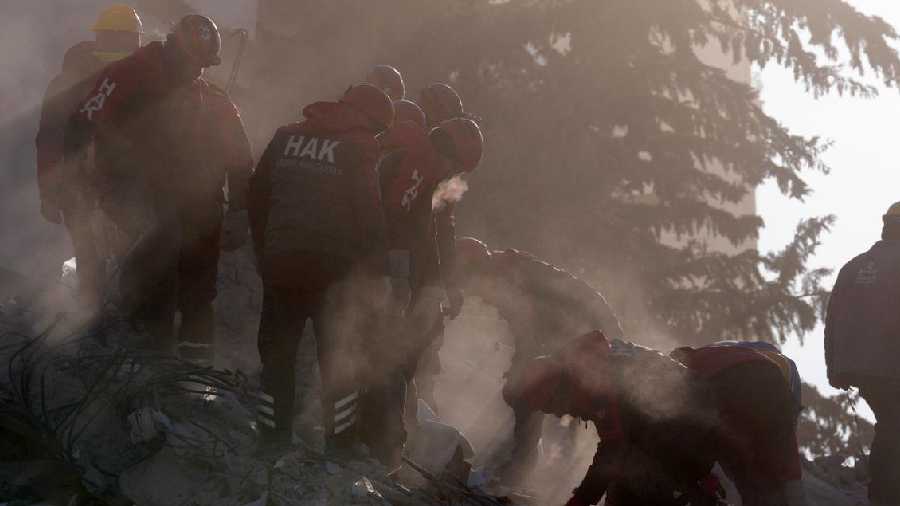The death toll from the earthquakes that struck Turkey and Syria earlier this week rose to more than 17,500 on Thursday, as rescuers scrambled for survivors trapped beneath the rubble in freezing winter conditions.
There were 14,351 people confirmed dead in Turkey, Vice President Fuat Oktay said.
President Recep Tayyip Erdogan visited the city of Gaziantep, where 944 of over 6,400 buildings were destroyed.
Earlier on Thursday, Turkish state news agency Anadolu Agency, citing the country's disaster management bureau, reported that 12,873 people had died in Turkey alone from the quake.
Syria's health ministry, meanwhile, has calculated the death toll in government-controlled areas in the country at more than 1,200. The White Helmets responders group based in Syria's rebel-held region in the northwest said at least 1,600 people had died.
The Turkish government admitted on Wednesday that the country's disaster response could have been better.
Access to Twitter in the country — throttled following a flurry of online criticism of authorities — was restored early on Thursday after talks between the company and Turkish officials.
EU leaders vow support for Turkey
The 27 leaders of the European Union expressed solidarity with Turkey in a letter to Turkish President Recep Tayyip Erdogan.
The bloc's leaders said that the people of Turkey are "experiencing a harrowing ordeal" and vowed to "stand ready to further step up" support for the country.
"Our thoughts continue to be with the families who have lost loved ones and those still awaiting news," European Council President Charles Michel tweeted.
Germany to send aid flight to Turkey
The German Press Agency (dpa) reported that the German Air Force was preparing Airbus A400M aircraft for humanitarian aid flights to Turkey on Thursday morning.
The aircraft were scheduled to take off before noon local time (1100 GMT) from the Wunstorf base in the northwestern state of Lower Saxony, according to the air force.
Seven trucks have brought about 50 tons of relief supplies the city of Ulm in the southwestern state of Baden-Württemberg to the military airport. They were packed with almost 2,000 camp beds, as well as sleeping bags, blankets, tents, heaters and sleeping mats.
Aid convoy arrives in Syria
An aid convoy has reached northwestern Syria, news agencies said citing border crossing sources.
A correspondent for Agence France-Press (AFP) reported seeing six trucks passing through the crossing from Turkey, carrying tents and hygiene products.
Syrians need 'more of absolutely everything' — UN envoy
UN special envoy Geir Pedersen said that Syrians impacted by the earthquake need "more of absolutely everything.
"We need to do everything to make sure that there are no impediments whatsoever to the life-saving support that is needed in Syria," Pedersen said.
He said that the UN had received assurances that aid would reach northwestern Syria on Thursday and demanded that aid not be "politicized."
"We were assured today that we would be able to get through the first assistance today" through the Bab al-Hawa crossing, the envoy said.
"Our immediate asks are two: access and resources. We need life-saving aid. It's desperately needed by civilians, wherever they are, irrespective of borders and boundaries," Pedersen said.
"We need it urgently, through the fastest, most direct and most effective routes," he said.
Aid trucks headed for Syria's northeast
United Nations sources say six trucks carrying international relief supplies are due to arrive in northwestern Syria on Thursday.
The trucks — the first convoy of humanitarian help for people in that affected area — are set to use the only remaining open Bab al-Hawa border crossing with Turkey. Until now, the World Health Organization (WHO) says that partially repaired roads were too badly damaged to use.
Even before the earthquake, the crossing was a lifeline for some 4.5 million people. Some 90% of the population in the region was already dependent on humanitarian help.
The German government's human rights commissioner, Luise Amtsberg, has called for the opening of more border crossings to Syria.
At the behest of Damascus and Moscow, only the Bab al-Hawa frontier post has been open for aid deliveries to Syria for years. Helping victims in Syria, a country still in a state of civil war, is proving more difficult than in Turkey and is diplomatically delicate.
"We have to make it clear that the Assad regime and Russia can now show that the plight of the people is more important to them than political calculations," said Amtsberg.
Summary of Turkey-Syria earthquake events on Wednesday
Turkey's Foreign Minister Mevlut Cavusoglu said his country is working to open two additional border gates to Syria to enable humanitarian aid into the war-torn country.
European Commission President Ursula von der Leyen said a donor conference for international aid for Syria and Turkey in the wake of Monday's devastating earthquake has been planned for March.
For the first time in 24 years, the Istanbul stock exchange announced that it is closing for five days in response to the earthquake.
Turkish President Recep Tayyip Erdogan, who visited the disaster area, acknowledged "shortcomings" in his country's response to the huge earthquake.
The sanctions-hit Syrian government has put in an official request to the EU for emergency assistance through the civil protection mechanism, the bloc's commissioner for crisis management has said.











